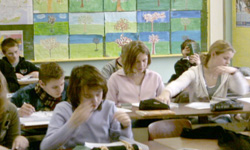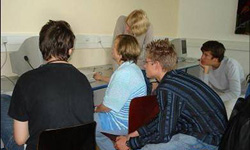Many people have a relationship with the Bible. For them the Bible embodies the basic values of our European culture.
The texts of the Bible are chosen as a source of inspiration for art, literature, films and discussions etc. In our everyday lives we also meet catchphrases and slogans which come from the Bible, without knowing their origin.
The aim of the project is to make pupils realize the values which are being handed down in the Bible and the power of the language used in it. Whilst reading the Bible pupils meet the characters of the Bible, and learn about their lives and values. Pupils increase their creativity and communication skills.They also get background knowledge about aspects like truth, justice, sympathy, generosity, forgiveness and love.
Within the project intercultural and foreign language knowledge are expanded and skills in the use of information and communication technologies are improved. The project "Across the Bible" was first launched on a national level in Denmark in 2003. We started the project with a new European dimension in etwinning. In the meantime schools take part Europe-wide (see Partners). The project manages to bring together several subjects such as arts, the English language, religious education, handicrafts, information and communication technologies, social studies, literature and so on and different schoolforms and age groups.
At the Peter-Petersen-School the subjects English and religious education take part in the project.
Pupils in the English lessons work in the forums of AtB.
In religious education at the Peter-Petersen-School we want to discover how these stories appeal to us and to what extent they are a challenge to us. As a working base we use the book the Bible as well as the Internet-Bibles (http://www.speakingbible.com/web/index.htm and www.bibel-online.net/) The themes and the stories that are connected with them follow the curriculum of the Country Hessen, Germany.
On our website we present a selection of biblical stories which we have studied in depth in our lessons. Within our studies we found out about the past time, the people of the past and their living conditions. We tried to find out the relevance of the stories for people nowadays and for us personally. We tried to discover if the Bible can be a guide for our actions today. and if we agree with the alliance which God formed with the people. We are seaching for answers for these questions.
Finally, we try in the project “Across the Bible, across Europe – Quer durch die Bibel, quer durch Europa” to pass on
a deepening knowledge about the Bible to the pupils of our own school as well as to the pupils at the European partner-schools. In this context we reflect on European roots and values to enable pupils taking part in inter-religious discussions like the “Trialog of the cultures”, to find answers to the question “What do you believe in then?”






